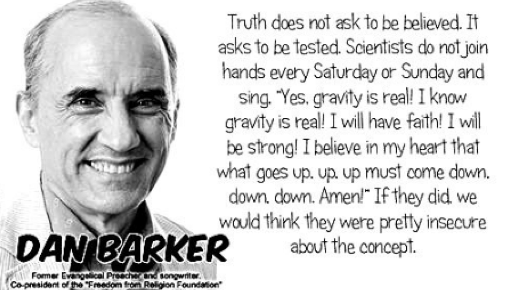
Freedom From Religion Foundation (FFRF) filed a lawsuit last month against House Chaplain Reverend Patrick Conroy for rejecting a secular invocation on the floor of the House.
According to Dan Barker, president of the group that promotes separation of church and state, Conroy refused him the opportunity to deliver a guest invocation because he happens to be an atheist. Barker filed the lawsuit on May 5, the same day that has been designated as the National Day of Prayer.
Apart from Conroy, Barker has also named Speaker Paul Ryan and several other members of the chaplain’s staff, requesting the court to compel Conroy to allow him to address the House.
“I would really love the opportunity to participate in solemnizing Congress,” Barker said in an interview. “We hope that I, or an atheist, be allowed to deliver a guest invocation before Congress.”
The Office of the House Chaplain refused to respond to several requests for comment.
Barker’s lawsuit is the consequence of a yearlong attempt by FFRF to reopen a longstanding fight over whether it is constitutional for a religious leader to open the daily session in Congress.
But, Robert Destro—director of the law and religion program at Columbus School of Law, Catholic University—believes it would be rather difficult for Barker to get the court to rule in his favor because Congress has too much power under the Constitution to determine how such things operate.
“This is a fundamental separation of powers problem,” Destro said. “The House and Senate are authorized by Article I to make their own rules. The rules governing what the chaplain does rest on that power.”
The House as well as Senate both hire full time chaplains to provide pastoral services to members, conduct religious ceremonies and oversee the Congressional Prayer Room. Conroy was nominated for the post in 2011 by then Speaker John Boehner before being elected chaplain by members of the House. As with any other House chaplain, Conroy too is responsible for delivering and supervising the opening prayer at the start of each session of the House. His office is also known to organize a guest chaplain program where House members are asked to nominate clergy to fill the slot occasionally.
In 2015, Barker said he had spoken with Congressman Mark Pocan, requesting to be sponsored for one of the available guest opportunities. In his lawsuit, Barker claims approximately 40 percent of daily prayers on the floor of the House have been delivered by guest chaplains from 2000 to 2015; and none of the 857 guest chaplains in that duration were non-believers or atheists.
Pocan wrote to Conroy on February 18, 2015, informing the chaplain of Barker’s request and explaining his plan to offer the House of Representatives a positive invocation focusing on leading a loving, happy, moral and purposeful life. Following this communication, Barker submitted his formal biography and a draft of the invocation he intended to deliver. His request was eventually denied via a December 2015 mail sent from Conroy’s office, with staff members saying all previous guest chaplains have continued to practice in the denomination in which they had been ordained.
Barker—who was also ordained as a minister of Christ in the Christian Center Church, Stanford, California in 1975 and served as a pastor at different churches—publicly declared his atheism in 1984.
“Daniel Barker was ordained in a denomination in which he no longer practices,” the email from Conroy’s office read.
Barker alleges in his lawsuit that he was discriminated against for being an atheist. According to official documents, he has retained his ordination and continues to use his credentials to officiate weddings across the United States.
In January this year, Conroy sent a letter to Pocan, explaining how it has been a longstanding requirement for guest chaplains to be ordained by a recognized body of faith that he or she still practices.
“This is a substantive requirement — not a mechanical or check-the-box requirement,” Conroy wrote. “For example, I do not invite Member-recommended individuals who have obtained an Internet-generated ordination to serve as guest chaplains, even if they hold deep and long-standing religious beliefs.”
Barker believes he had met all the requirements outlined by the chaplain’s office.
Calling his rejection ‘a slap in the face’, he said, “I am struck by the indignity of a government official deciding who is in and who is out on religious grounds.”
Photo Credits: Think Atheist
